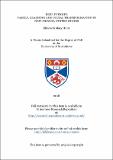Files in this item
Keep it tight : family, learning and social transformation in New Mexico, United States
Item metadata
| dc.contributor.advisor | Toren, Christina | |
| dc.contributor.author | Hurst, Elizabeth Mary | |
| dc.coverage.spatial | 238 p. | en_US |
| dc.date.accessioned | 2018-09-11T13:28:10Z | |
| dc.date.available | 2018-09-11T13:28:10Z | |
| dc.date.issued | 2018-12-07 | |
| dc.identifier.uri | https://hdl.handle.net/10023/16008 | |
| dc.description.abstract | This dissertation examines learning as part of social transformation in a semi-rural town in New Mexico, United States. It incorporates a focus on young people through direct work with children and observations in school and argues that each person’s understanding is historically emergent from what sense they make of the events of their personal history as this unfolds over time in intersubjective relations with others. This has implications for the ways in which Hispano/a and Latino/a people living in “Bosque Verde” make sense of concepts like respect, hard work and obligation, as well as how they think about family and children’s wellbeing. The ways in which people experience and understand getting older and their movements from child to adult/parent and from parent to grandparent/elder are central to this process of making sense. As people age, what they know to be true transforms, as does how they perceive the effects of social change. For people living in Bosque Verde, this includes both the experience of contemporary social and economic shifts in New Mexico and the United States, as well as how people there have made sense of social marginalisation over the past century and back into the more distant past. Parents and elders manifest historical consciousness of these transformations in part through their concerns for children and their vulnerability in an insecure and unequal world. Children, however, constitute their own ideas about family, hard work, care and respect in ways that potentially transform their meaning, as well as the possibilities of their own futures. This thesis therefore describes ‘keeping it tight’ in Bosque Verde as a microhistorical process that shapes how people understand and experience social relationships over the lifetime. This process, in turn, influences how people living there make sense of the past and imagine the future for themselves and others. | en_US |
| dc.description.sponsorship | "This work was generously supported by the Economic and Social Research Council (ESRC) through a PhD studentship, fieldwork allowance and funding for an institutional visit [award 1358752/1369853]." -- Acknowledgements | en |
| dc.language.iso | en | en_US |
| dc.publisher | University of St Andrews | |
| dc.subject | Learning | en_US |
| dc.subject | Children | en_US |
| dc.subject | Intergenerational transformation | en_US |
| dc.subject | Historical consciousness | en_US |
| dc.subject | New Mexico | en_US |
| dc.subject | United States | en_US |
| dc.subject.lcc | LB1125.H8 | |
| dc.subject.lcsh | Learning--Social aspects--New Mexico--Case studies | en |
| dc.subject.lcsh | Children--New Mexico--Case studies | en |
| dc.subject.lcsh | Families--Social aspects--New Mexico--Case studies | en |
| dc.subject.lcsh | Social change--New Mexico--Case studies | en |
| dc.subject.lcsh | New Mexico--Social life and customs--21st century | en |
| dc.title | Keep it tight : family, learning and social transformation in New Mexico, United States | en_US |
| dc.type | Thesis | en_US |
| dc.contributor.sponsor | Economic and Social Research Council (ESRC) | en_US |
| dc.type.qualificationlevel | Doctoral | en_US |
| dc.type.qualificationname | PhD Doctor of Philosophy | en_US |
| dc.publisher.institution | The University of St Andrews | en_US |
This item appears in the following Collection(s)
Items in the St Andrews Research Repository are protected by copyright, with all rights reserved, unless otherwise indicated.

